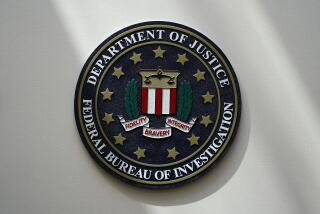Might a military jury deny 9/11 suspect’s death wish?
Reporting from Washington — His words leave little doubt about his role. It is his punishment that remains uncertain.
Four years ago, Khalid Shaikh Mohammed not only brazenly portrayed himself as mastermind of the terrorist attacks of Sept. 11, 2001. The senior Al Qaeda operative also bragged to a U.S. military tribunal that he had directed other major terrorist attacks around the globe.
Mohammed claimed responsibility for the first World Trade Center bombing in 1993, for the “shoe bomber” attempt to blow up a U.S. airliner in 2001, for the deadly bombing of a nightclub in Indonesia, for planned assassination attempts against Pope John Paul II and President Clinton, and for aborted attacks in London, Los Angeles, Chicago and elsewhere.
He even boasted that he had personally decapitated Wall Street Journal reporter Daniel Pearl in Karachi, Pakistan. “For those who would like to confirm, there are pictures of me on the Internet holding his head,” Mohammed said.
But it’s not clear whether his confessions, which mirrored those he made after being waterboarded 183 times by CIA interrogators in 2003, can be used against him in military court. Moreover, now that the Justice Department has transferred his case and that of his four alleged co-conspirators to a military commission at the U.S. naval base at Guantanamo Bay, Cuba, winning a death sentence may not come easy.
Under military commission rules, Mohammed cannot plead guilty to a crime that carries the death penalty, although he told military authorities at Guantanamo that he hopes to be executed. Experts said a jury made up of U.S. military officers might be less likely to grant his wish than a jury of citizens in New York, where his civilian trial was to have been held and where anger over Sept. 11 still runs deep.
The U.S. military last executed a convicted criminal 50 years ago this month, when an Army private was hanged for rape and attempted murder.
Seven men sit on military death row.
Among them is Hasan Akbar, a Muslim convert from Los Angeles who killed fellow U.S. soldiers in Kuwait on the eve of the 2003 U.S.-led invasion of Iraq. Convicted of double murder, Akbar has spent six years on death row, with no execution in sight.
Mohammed’s hopes to be executed, ironically, may help save his life. Sending him to his death could reward him with hero status in Al Qaeda, where he would be viewed as a martyr. U.S. juries may be loath to oblige.
Zacarias Moussaoui, another Al Qaeda conspirator, pleaded guilty to capital charges in federal court in Alexandria, Va., for trying to join the Sept. 11 plot. During his sentencing hearing in 2006, he twice took the stand and boasted about his terrorist credentials. He asked the jurors to execute him, but they sentenced him to life in prison with no chance of parole.
Still, civilian juries in federal court tend to hand out stiffer sentences than military juries. In the federal system, three executions have been carried out in the last decade, including that of Oklahoma City bomber Timothy McVeigh.
“The federal courts are given to stricter sentences,” said Eugene Fidell of Yale University, president of the National Institute of Military Justice. “He would have stood a better chance of getting the death penalty in Manhattan.”
Capt. Glenn Sulmasy, who teaches military law at the U.S. Coast Guard Academy, said no jury was likely to be sympathetic. “There is a sense of not wanting to satisfy his desire to win adulation for his cause,” Sulmasy said. “But it is also hard for any jury to hear anyone say they want to kill innocent civilians and children.”
According to Pentagon documents, Mohammed’s computer hard drives contained detailed information about the Sept. 11 operation, including “code names, airline company flight number, target, pilot name and background information, and names of the hijackers.”
Also recovered were photos of the 19 hijackers, their resumes and the pilot’s license for lead hijacker Mohamed Atta, along with letters to Al Qaeda leader Osama bin Laden, and spreadsheets recording financial disbursements for the plot.
Furthermore, a 2009 federal indictment that prosecutors had hoped to use in New York said that Mohammed first suggested flying planes into U.S. buildings to Bin Laden in 1999, and a month before the attacks, he personally advised Bin Laden of the Sept. 11 date.
After he was captured in Pakistan in 2003, Mohammed was held at a secret CIA prison. He was transferred to the Guantanamo detention camp in 2006. At a status review hearing there a year later, he presented a handwritten “final statement” claiming he had supervised about 30 terrorist plots, including one that sought to blow up a dozen airplanes over the Pacific.
But Mohammed took special pride in the Sept. 11 attacks, calling himself the “emir,” or commander.
“I was responsible for their training and readiness for the execution of the 9/11 operation,” he said. “Also, I hereby admit and affirm without duress that I was a responsible participant, principal planner, trainer, financier, executor.”
More to Read
Sign up for Essential California
The most important California stories and recommendations in your inbox every morning.
You may occasionally receive promotional content from the Los Angeles Times.











